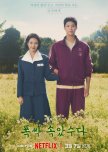This review may contain spoilers
A simply beautiful story about family and life successfully told.
This will be the first review I have written on MDL.
When Life Gives You Tangerines 🍊 (2025)
I knew this drama would end up being similar to my expectations, but the storytelling elevated the experience further. For such a simple story, the storytelling was stellar, along with the cinematography, to keep the audience on their toes and their hearts softened. The history of Jeju was richly presented by aligning the struggles of villagers and Aesun and Gwansik, whose lives were filled with emotional, grand and simple moments. I was reminded of my parents whenever Aesun and Gwansik, as grandparents, stood by each other, and so I resonated with the sad, happy, and funny moments in the story, especially through the eyes of Geum-myeong and how she ended up being their treasure and so-called princess.
Besides the main story, side characters were tied to the storyline and were important to the lives of the main characters, which I enjoyed a lot for a slice-of-life drama. The direction and visuals, helmed by the director of critically acclaimed dramas like My Mister, Signal, and Arthdal Chronicles, left me breathless. The budget was intentionally spent, and I appreciated that a lot. The actors and actresses did their job, especially IU, who played Ae-sun and Geum-young and showed her versatility as an actress in between the relationship of a mother and her daughter. So did Park Bogum, who I didn't see in a project elsewhere except Reply 1988 in 2015, he crafted the image of a young father to his grown-up self, played by Park Hae-Joon. Moon So-ri was as great as Ae-sun, she felt like a real person to me with all of her emotions as a mother who once had dreams of her own. I never felt a disconnection between the same characters played by two different actors and actresses.
Volumes 1-4 each had a central theme that resembled a tribute to the younger generation and a great thank you to the elder generations. From the dreams of youth to the hardships and regrets of adulthood and parenthood, to the uncertain events in history that struck the country were covered in the seasons of time, fall, summer, winter, and spring.
The ahjummas and other roles, such as Bu Sang-gil and Yeom Hyeran, convinced me that their characters were, in fact, just as important in bringing the scenes of family and community that stood out to me in symbolism out of all the dramas I've seen. Kim Seon-ho was wonderful too. Two mother-daughter relationships were excellently written, and the messages of the story were strongly supported through their scenes and how they contributed to the growth of the female characters throughout. I would like to write about the scenes that impacted me the most, but I will mention that the death of Dong-myeong truly broke me. Bogum as Gwan-sik's cries were haunting, and IU as Ae-sun in complete denial hurt me badly. In a way, I will never forget, and how they have not forgotten what happened to him from the guilt and regret that arose in their hearts and minds.
The music wasn't that spectacular for me, but I still was able to cry at quite a few scenes because of the powerful writing and acting. The rewatch value remains low since I never rewatch dramas fully, but for anyone who would rewatch, I would suggest they skip many moments in the middle of the drama instead. The timelines involving the lives of Geum-myeong and Eun-myeong were not captivating or interesting for the most part, but there are still many moments to look forward to. I will be thinking about this show briefly whenever I think of my family, especially my mother. A lot of lines were special to me.
I loved that Ae-sun was able to write poetry, including her long-lasting marriage in the warm spring and that Gwan-sik's last moments had him thinking about the love of his life. This show was able to focus on the romance of the parents in the last episode and how their love had them walking hand-in-hand and overcoming each hardship together. The last line is deeply emotional and summarizes the message of the story,
"To their seasons,
once so young and still so tender.
With remorse, gratitude, and the deepest respect.
Here's to all you have been through."
When Life Gives You Tangerines 🍊 (2025)
I knew this drama would end up being similar to my expectations, but the storytelling elevated the experience further. For such a simple story, the storytelling was stellar, along with the cinematography, to keep the audience on their toes and their hearts softened. The history of Jeju was richly presented by aligning the struggles of villagers and Aesun and Gwansik, whose lives were filled with emotional, grand and simple moments. I was reminded of my parents whenever Aesun and Gwansik, as grandparents, stood by each other, and so I resonated with the sad, happy, and funny moments in the story, especially through the eyes of Geum-myeong and how she ended up being their treasure and so-called princess.
Besides the main story, side characters were tied to the storyline and were important to the lives of the main characters, which I enjoyed a lot for a slice-of-life drama. The direction and visuals, helmed by the director of critically acclaimed dramas like My Mister, Signal, and Arthdal Chronicles, left me breathless. The budget was intentionally spent, and I appreciated that a lot. The actors and actresses did their job, especially IU, who played Ae-sun and Geum-young and showed her versatility as an actress in between the relationship of a mother and her daughter. So did Park Bogum, who I didn't see in a project elsewhere except Reply 1988 in 2015, he crafted the image of a young father to his grown-up self, played by Park Hae-Joon. Moon So-ri was as great as Ae-sun, she felt like a real person to me with all of her emotions as a mother who once had dreams of her own. I never felt a disconnection between the same characters played by two different actors and actresses.
Volumes 1-4 each had a central theme that resembled a tribute to the younger generation and a great thank you to the elder generations. From the dreams of youth to the hardships and regrets of adulthood and parenthood, to the uncertain events in history that struck the country were covered in the seasons of time, fall, summer, winter, and spring.
The ahjummas and other roles, such as Bu Sang-gil and Yeom Hyeran, convinced me that their characters were, in fact, just as important in bringing the scenes of family and community that stood out to me in symbolism out of all the dramas I've seen. Kim Seon-ho was wonderful too. Two mother-daughter relationships were excellently written, and the messages of the story were strongly supported through their scenes and how they contributed to the growth of the female characters throughout. I would like to write about the scenes that impacted me the most, but I will mention that the death of Dong-myeong truly broke me. Bogum as Gwan-sik's cries were haunting, and IU as Ae-sun in complete denial hurt me badly. In a way, I will never forget, and how they have not forgotten what happened to him from the guilt and regret that arose in their hearts and minds.
The music wasn't that spectacular for me, but I still was able to cry at quite a few scenes because of the powerful writing and acting. The rewatch value remains low since I never rewatch dramas fully, but for anyone who would rewatch, I would suggest they skip many moments in the middle of the drama instead. The timelines involving the lives of Geum-myeong and Eun-myeong were not captivating or interesting for the most part, but there are still many moments to look forward to. I will be thinking about this show briefly whenever I think of my family, especially my mother. A lot of lines were special to me.
I loved that Ae-sun was able to write poetry, including her long-lasting marriage in the warm spring and that Gwan-sik's last moments had him thinking about the love of his life. This show was able to focus on the romance of the parents in the last episode and how their love had them walking hand-in-hand and overcoming each hardship together. The last line is deeply emotional and summarizes the message of the story,
"To their seasons,
once so young and still so tender.
With remorse, gratitude, and the deepest respect.
Here's to all you have been through."
Was this review helpful to you?


























